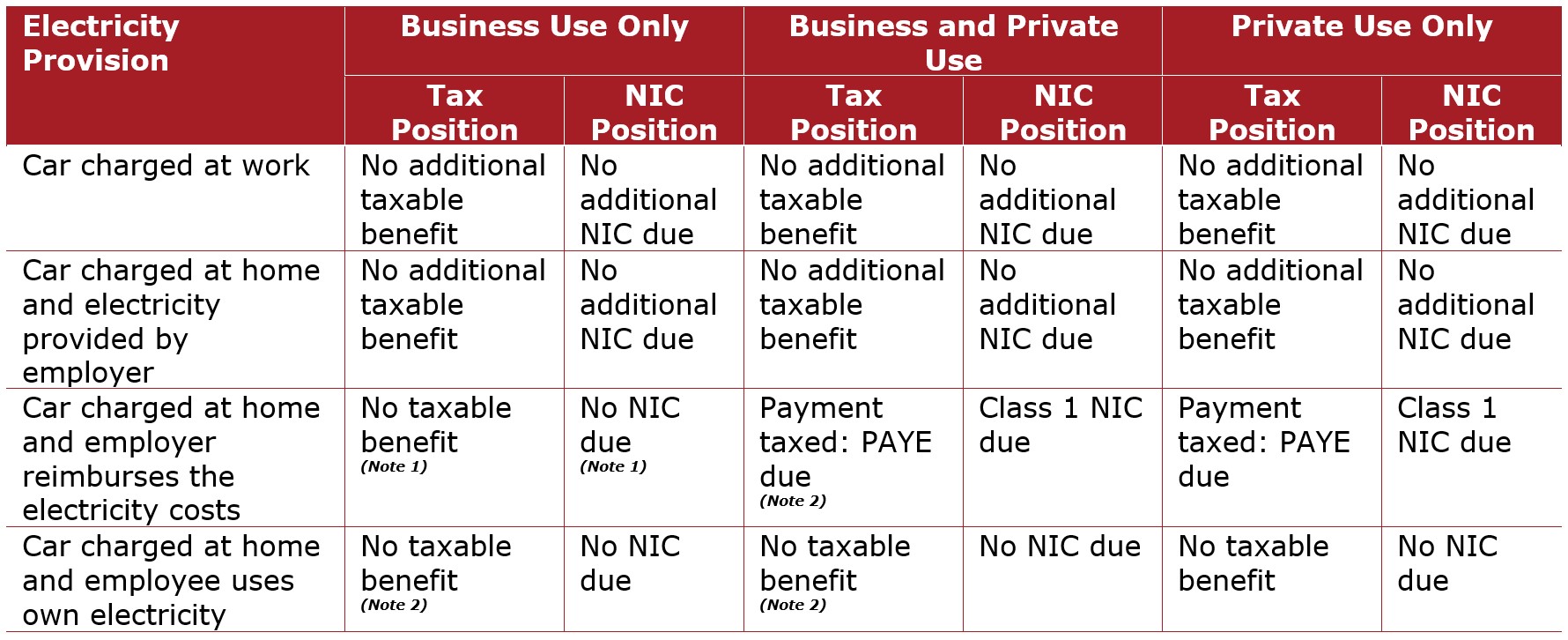What are the potential benefits for an employee switching to a fully electric company car?
For employees who are used to receiving the benefit of a company car, much can be said for considering changing to an all-electric vehicle. In addition to the potential tax savings a zero-emission electric car can provide, an employee would also undoubtably be reducing their carbon footprint in the process.
Company car: Benefit in kind
Where an employer provides an employee with an all-electric company car, which is available for private use, a taxable benefit in kind position still arises as it does with conventional fuel-powered company cars.
The benefit charge is calculated using the standard method for company cars and it is important to include the cost of the battery for the car when establishing the list price even if the battery is leased separately to the car. Whilst an all-electric car may have a significantly higher list price than a conventional diesel or petrol car, the company car benefit charge can be considerably lower, as the charge is calculated with reference to the CO2 emissions.
For example, for the 2021-22 tax year the appropriate percentage rate to calculate the car benefit value for a zero-emission all-electric company car is only 1%, rising to 2% for the 2022-23 tax year and is set to remain at this rate until at least 5 April 2025.
Compare this to an average-sized petrol car first registered from 6 April 2020 with CO2 emissions of 130g/km, where the appropriate car benefit rate for the 2021-22 tax year is 30%.
Company car fuel benefit position
A company car fuel benefit charge does not apply to an all-electric car, as it would for a conventional fuel-powered or even a hybrid plug-in car – this is because electricity is not treated as a fuel for the purposes of the company car fuel benefits legislation.
Advisory electric rate for company cars
An advisory electric rate for business mileage undertaken in fully-electric company cars was introduced from 1 September 2018. The current rate in place is 5 pence per business mile.
This means that where an employer reimburses an employee this rate (or a lower rate) for business mileage travelled in their all-electric company car, no taxable charge or National Insurance Contributions (NIC) liability will arise. If an employer chooses to pay a higher amount than the advisory rate, they will need to demonstrate with supporting evidence that the electricity cost per mile is higher, otherwise there will be additional tax and NIC liabilities arising.
Salary sacrifice for electric company cars
Since 6 April 2017, with the introduction of the optional remuneration arrangements rules, the tax and National Insurance advantages previously enjoyed by employees who received a benefit in kind in exchange for giving up an amount of their salary (sacrificed) have largely been withdrawn. Under these latest rules, the employee will be taxed on the greater of the salary given up and the taxable value of the benefit received.
There are, however, exemptions to these rules, the most significant being where an employer provides an employee with a company car that produces CO2 emissions of no more than 75g/km. For company cars which meet this criterion and are provided under a salary sacrifice, the normal benefit in kind rules apply, meaning that no adjustment is required to the difference between the salary given up and the value of the benefit received.
Therefore, it is possible that a salary sacrifice using an all-electric car could prove an attractive proposition to both the employee and the employer.
It is, however, important to remember that a salary sacrifice scheme must be considered effective to avoid being challenged by HMRC. Further, since an employee is reducing their salary, they need to be mindful that this can affect their entitlement to statutory payments, such as sick pay or other life items such as mortgage applications. A salary sacrifice cannot reduce an employee’s earnings below the National Minimum Wage rates.
Charging of electric company cars
There are different tax and National Insurance Contributions (NIC) considerations in relation to the provision of electricity for an electric company car, which depends on how the car is used and how the electricity is provided.
The table below sets out the position –
Notes
(1) From 6 April 2016 the exemption under Section 289A ITEPA 2003 for paid or reimbursed expenses would exempt the amount received.
(2) Employee can look to claim tax relief (via HMRC) for business miles travelled.Furthermore, where an electric company car is made available to an employee and the employer pays for a charging point to be installed at the employee’s home or pays for a charge card of £100 per year (allowing the employee unlimited access to local authority vehicle charging points) no additional benefit charge arises.
Summary
The provision of an all-electric car by an employer clearly has the potential to result in significant personal tax savings for employees. Coupled with the “feel good” factor of driving a very low polluting vehicle, the dual benefits are well worth considering further.
GuildHUB is an information resource, provided free of charge by The Guild, for accounting professionals and their clients. If you wish to contact The Guild, please email contact@trusttheguild.com.
The content of this article is for guidance only and shall not constitute advice. Please seek independent advice or contact GuildHUB for information about its services.
Send us your question and we will be in touch



